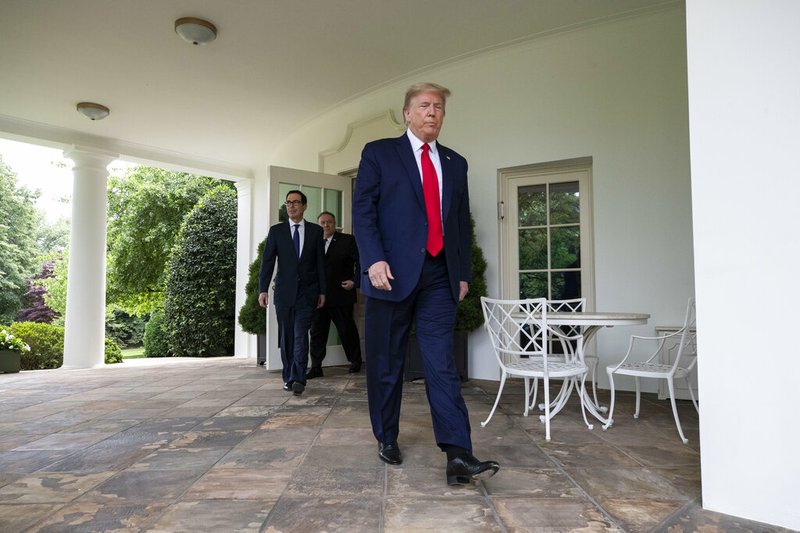WASHINGTON — President Donald Trump announced Friday he would end Hong Kong’s special trade status and suspend visas of Chinese graduate students suspected of conducting research on behalf of their government — escalating tensions with China.
Tensions over Hong Kong have been increasing over the past year as China has cracked down on protesters and sought to exert more control over the former British territory.
The president said in a White House announcement that the administration would begin eliminating the “full range” of agreements that had given Hong Kong a relationship with the U.S. that mainland China lacked, including exemptions from controls on certain exports. He said the State Department would begin warning U.S. citizens of the threat of surveillance and arrest when visiting the city.
“China has replaced its promised formula of one country, two systems, with one country, one system,” he said.
Secretary of State Mike Pompeo notified Congress on Wednesday that Hong Kong is no longer deserving of the preferential trade and commercial status it has enjoyed from the U.S. since it reverted to Chinese rule in 1997.
It’s not yet clear what impact the decision will have on U.S. companies that operate in Hong Kong or on the city’s position as Asia’s major financial hub, or how China will react to the decision.
“The downward spiral in the bilateral relationship has now reached lows not seen since the June 4, 1989, Tiananmen massacre, and there is little reason to expect things to get better soon,” said Dexter Tiff Roberts, an Asia expert at the Atlantic Council, which publishes non-partisan policy analysis.
Rep. Chris Smith, a New Jersey Republican who is a commissioner of the Congressional Executive Commission on China, praised the decision on Hong Kong as an overdue response to the government of President Xi Jinping for human rights abuses, including against members of religious minorities in the Xinjiang region.
“After years of human-rights admonishment and cheap rhetoric devoid of any meaningful penalties, Xi has concluded that the West is all talk, no action,” Smith said. “President Trump, however, is today beginning to change that and is doing what previous presidents have failed to do.”
The president also said the U.S. would be suspending entry of Chinese graduate students who are suspected of taking part in an extensive government campaign to acquire trade knowledge and academic research for the country’s military and industrial development.
Allowing their continued entry to the country would be “detrimental to the interests of the United States,” Trump said in an order released after the White House announcement.
Revocation of the visas has faced opposition from U.S. universities and scientific organizations that depend on tuition fees paid by Chinese students to offset other costs and fear possible reciprocal action from Beijing that could limit their access to China.
The order issued by the president included an exemptions for students whose work was not expected to benefit the Chinese military.
China seemed to signal in recent days that it was hoping to ease tensions. Premier Li Keqiang told reporters on Thursday that both countries stood to gain from cooperation, and to lose from confrontation, because their economies have become so interconnected.
“We must use our wisdom to expand common interests and manage differences and disagreements,” Li said.
Still, the country has insisted that its control of Hong Kong is an internal matter and it has disputed that it mishandled the response to the virus.
Information for this article was contributed by Kevin Freking and Jamey Keaten of The Associated Press.
This story has been updated. The original version is below.
Trump says U.S. to sanction Chinese officials over Hong Kong
WASHINGTON — President Donald Trump on Friday said the U.S. would sanction the Chinese officials responsible for eroding the autonomy of Hong Kong.
On Thursday, China’s National People’s Congress approved a national security law aimed at suppressing secessionist and subversive activity in Hong Kong, overriding any potential opposition by local lawmakers.
In his remarks from Washington, Trump blasted China, saying Hong Kong is no longer “sufficiently autonomous” to warrant the preferred status that the U.S. had been giving the former British colony when it comes to export controls, extradition treaties and travel.
“Basically, he’s going to treat Hong Kong the way he treats China,” said Sam Stovall, chief investment strategist at CFRA.
Washington and Beijing have been trading harsh rhetoric recently on everything from Hong Kong to the response to the coronavirus outbreak. Investors are worried that it could lead to another round of escalating tariffs between the two countries.
